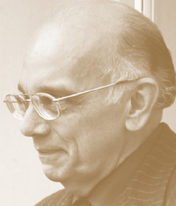Acceptance speech
To
receive the Erasmus Prize represents much more than a paramount honor to me. It
is, above all, a significant ethical compromise, one which powerfully beckons
my responsibility as a man and as an artist.
I dedicate this prestigious award to all those altruistic music teachers who,
with admirable solidarity and strong faith, have tirelessly accompanied me over
four decades in the founding, construction and development of the National
System of Youth and Children Orchestras and Choruses of Venezuela. In the
performance of our task, we confirm daily the fundamental importance of values
such as tolerance, cultural diversity and the free expression of critical
thinking which, by the way, are admirably inspired by this Erasmus Prize
Foundation, a worldwide model, for its eminent contribution to society, to
culture and to social sciences. The Foundation appears to us a worthy messenger
of the vast and profound Erasmus thinking by virtue of which knowledge is to
prevail over ignorance, and order over chaos; all of this by means of a high
standard of humanistic education charged with civilizing energy, infused with
classical spirit in its maximum and optimal dimension.
On the other hand, such a formidable contribution corresponds entirely to the
exceptional cooperation that the Netherlands has always provided to the musical
youths and children of our country, particularly in the person of His
Excellency, former Ambassador Dick C.B. den Haas, whose personal commitment
enabled the Venezuelan Orchestra System to reach the highest academic goals and
outstanding artistic achievements.
In this connection, we should point out that the Venezuelan System of Youth and
Children Orchestras and Choruses presently incorporates over 370,000 children
and youths of medium and low resources from all the provinces in our country.
Today, more than ever, we are encouraged by the decided purpose of dignifying,
through Musical Formation, boys, girls and adolescents who live on the streets;
the juvenile and infantile population attending Middle and Elementary Public Schools;
the children and adolescents affected by severe physical and mental
disabilities; and young inmates of both sexes who acquire the necessary skills
to play musical instruments and train their voices in their prisons while they
await their re-introduction in the community as music professionals.
Since infancy, I had the opportunity of embracing Musical Vocation, which is
why I ardently desired to share it with the largest possible number of
Venezuelan youths and children who live in conditions of marginality and social
exclusion. Doubtlessly, this meant radically transforming the existing
conception of the Music Teacher, who was almost exclusively trained for
instruction of the individual. At the same time, this implied a
re-interpretation of the mission assigned to Schools and Conservatories, with
the goal of consolidating Musical Education in my country on a gigantic social
scale. In this way, with the steadfast support of a number of honorable
Venezuelan Maestros, and with particular intensity since February 1975, we
established the pedagogical social and artistic principle within which daily
Orchestral and Choral practice needed to be understood as indispensible
complement of Individual Instruction, within the bosom of the Student-teacher
relationship. Today, El Sistema grows rapidly in Europe and Asia, sprouts in
South Africa and illuminates the musical horizon of Australia and New Zealand.
For those of us who Play, Sing and Strive within the Project, the dream has
taken on planetary proportions.
Because of the formidable societal impact of the System, in Venezuela we seek
to meet with music, not only at concert halls, but also in personal and
everyday affairs, battling against the perverse use of leisure, against drugs
and violence, thus simultaneously promoting the access of those in need of
Aesthetic Formation and a Life of Art. Material poverty will be categorically
vanquished by the sublime spiritual richness that grows through and in the
music. Social justice and cultural justice constitute two aspects of a sole and
indissoluble dimension.
In perennial syntony with the gigantic legacy of Erasmus, we aspire to devote
the remainder of our existence to the noble ideal of a New Musical Art, one
that beyond its aesthetic dimension, shines as a proud symbol of immense human
development and a rebirth of ethical conscience: Temple of Beauty and of Truth,
Paradise of Love and Hope for all children of the world. The monumental
heritage of Erasmus of Rotterdam does not in vain express absolute condemnation
of fanaticism and war, alongside an ardent vow to the ideal of an ascending and
creative social structure, constituted by increasingly elevated and sublime
human relations, presided by Harmony, Equity and Reason.
I could not end these words without invoking the generous solidarity of Your
Royal Highnesses and the Erasmus Prize Foundation, with the glorious utopia of
a Worldwide Youth Musical Movement, primarily devoted to the excluded and the
poor, birth and sign of a Universal Culture of Peace.
